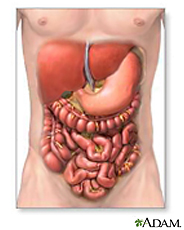
Common Procedures
Acute Abdominal EmergenciesPerforated Viscus
Gastrointestinal Bleeding
Acute Pancreatitis
Acute Appendicitis
Acute Cholecystitis
Acute Diverticulitis
Bowel Obstruction
Hernia Emergencies
More Procedures:
Acute Soft Tissue Infection
Emergency Vascular Access
Surgical Consultation
Operative Exposure
Recognize Medical Emergencies
According to the American College of Emergency Physicians, the following are warning signs of a medical emergency:- Bleeding that will not stop
- Breathing problems (difficulty breathing, shortness of breath)
- Change in mental status (such as unusual behavior, confusion, difficulty arousing)
- Chest pain
- Choking
- Coughing up or vomiting blood
- Fainting or loss of consciousness
- Feeling of committing suicide or murder
- Head or spine injury
- Severe or persistent vomiting
- Sudden injury due to a motor vehicle accident, burns or smoke inhalation, near drowning, deep or large wound, etc.
- Sudden, severe pain anywhere in the body
- Sudden dizziness, weakness, or change in vision
- Swallowing a poisonous substance
- Upper abdominal pain or pressure
Acute Abdominal Emergencies
 The term acute abdomen refers to a sudden, severe abdominal pain of unclear etiology[1] that is less than 24 hours in duration. It is in many cases a medical emergency, requiring urgent and specific diagnosis. Several causes need surgical treatment. » more
The term acute abdomen refers to a sudden, severe abdominal pain of unclear etiology[1] that is less than 24 hours in duration. It is in many cases a medical emergency, requiring urgent and specific diagnosis. Several causes need surgical treatment. » moreAcute Pancreatitis
Acute pancreatitis or acute pancreatic necrosis[1] is a sudden inflammation of the pancreas. Depending on its severity, it can have severe complications and high mortality despite treatment.While mild cases are often successfully treated with conservative measures, such as NPO (nil per os or nothing by mouth (NBM)) and aggressive intravenous fluid rehydration, severe cases may require admission to the intensive care unit or even surgery to deal with complications of the disease process. » more
Bowel Obstruction
Bowel obstruction (or intestinal obstruction) is a mechanical or functional obstruction of the intestines, preventing the normal transit of the products of digestion. It can occur at any level distal to the duodenum of the small intestine and is a medical emergency. » moreGastrointestinal Bleeding
Gastrointestinal bleeding or gastrointestinal hemorrhage describes every form of hemorrhage (loss of blood) in the gastrointestinal tract, from the pharynx to the rectum. » moreAcute Appendicitis
Appendicitis is a condition characterized by inflammation of the appendix. It is classified as a medical emergency and many cases require removal of the inflamed appendix, either by laparotomy or laparoscopy. Untreated, mortality is high, mainly because of the risk of rupture leading to peritonitis and shock. » moreAcute Cholecystitis
In 90% of cases, acute cholecystitis is caused by gallstones in the gallbladder. Severe illness and, rarely, tumors of the gallbladder may also cause cholecystitis. » moreAcute Diverticulitis
Acute Diverticulitis Diverticulitis is a common digestive disease particularly found in the large intestine. Diverticulitis develops from diverticulosis, which involves the formation of pouches (diverticula) on the outside of the colon. Diverticulitis results if one of these diverticula becomes inflamed. » morePages 1 2 | »

Tel. 302.781.3590 |